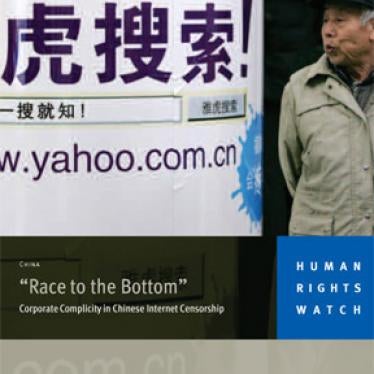In a groundbreaking speech at the Newseum on Thursday, Secretary of State Hillary Clinton reset U.S. policy on Internet freedom, emphasizing the vital need for governments, companies and technology providers to ensure that the World Wide Web is a force for human rights. Of course, the real test will come in how the Obama administration puts the new policy into practice.
Clinton named and shamed not only the usual Internet suspects such as China and Vietnam, but U.S. allies Egypt and Saudi Arabia - the first for arresting bloggers, the second for censoring religious speech.
Google's stunning announcement last week that it is prepared to leave China because of government censorship and surveillance is the most recent reminder of the threat to human rights online. While the company deserves praise for sounding the alarm, its threat to withdraw from the Chinese market underscores the need for governments and companies to implement effective human rights protections online or risk ceding the Internet to states that want to censor and spy on users.
In 2006, U.S. congressional hearings and human rights groups revealed how Yahoo had turned over to Chinese authorities information that led to the imprisonment of online activists. Microsoft and Google also acknowledged that they censored their search engines and some users' blogs. Since then, other problems have emerged:
- Burma's military government cut the telecommunications lines to the Internet during its brutal 2007 crackdown.
- Moscow is trying to implement controls that would allow it to spy on users or cut off the Internet from the rest of the world.
- Bloggers and online activists have faced pressure and harassment in Cuba, Egypt, Iran, Morocco and elsewhere.
- Last month a Moroccan court sentenced Bachir Hazzam, a 26-year-old Moroccan blogger, to four months imprisonment for "spreading false information harmful to the kingdom's image." His crime? He posted a statement on his blog authored by university students who denounced police violence and arrests against protesters demanding better public services.
Despite the pattern of repressive authorities trying to control the Internet, other governments have been slow to act. The Bush administration launched a Global Internet Freedom Task Force but never adopted a coherent strategy to protect human rights online.
There has, admittedly, been intermittent progress.
When the Chinese government ordered computer manufacturers in June to install Green Dam Youth Escort software, the backlash was enormous. The software, ostensibly designed to protect children from pornography and violence, also censored political speech and could allow governments to intrude on personal computers. China's netizens denounced the regulation and computer manufacturers, some software makers and the U.S. government criticized it. In August, the Chinese government quietly suspended its mandate.
And in October, the U.S. government adopted the Victims of Iranian Censorship Act to combat Iranian censorship and surveillance online following the disputed June elections. Among its provisions, the act requires the U.S. government to report on non-Iranian companies that provided technology to the Iranian government in order to censor or spy on its citizens. It also authorized $20 million to support new technologies to circumvent censorship and surveillance online. In December, the U.S. excluded social-networking software from controls on exports to Iran as a "vital tool for change."
But in the absence of a comprehensive government policy or regulation, Google, Microsoft, Yahoo, a coalition of human rights organizations (including Human Rights Watch), academics and socially responsible investors launched the Global Network Initiative in 2008. Under this voluntary initiative, member companies are required to adopt standards to protect freedom of expression and user privacy, monitored by a third party. While the GNI is promising, corporations have been slow to join it - a situation that can only benefit repressive governments and put users at risk. In her speech, Clinton urged corporations to act responsibly in keeping the Net open, and highlighted the GNI.
Clinton's speech could be a milestone in the battle for an open Internet because she detailed a comprehensive approach by the U.S. that presses governments to protect human rights online, requires companies to act responsibly, and provides support for innovative technologies to circumvent censorship.
That approach should also put governments like China's on the defensive, and perhaps force them to confront the reality that they risk denying hundreds of millions people access to the best products and services online simply to pursue their misguided effort to control information that displeases them.
The real test, however, is whether Clinton's words get put into practice.
_______________________
Arvind Ganesan is director of the Business and Human Rights program at Human Rights Watch and a board member of the Global Network Initiative.








